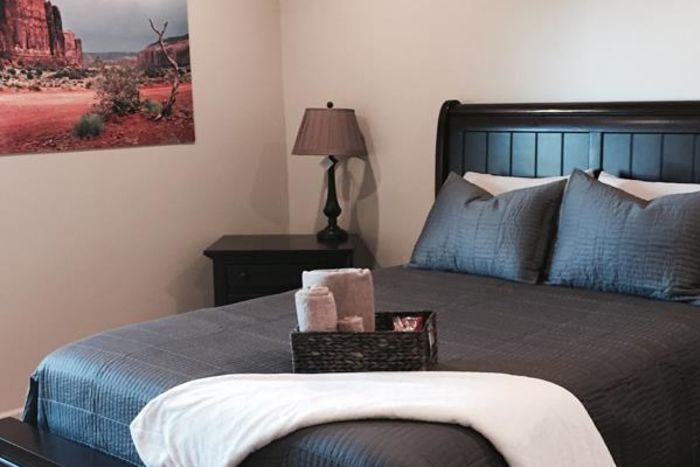During inpatient rehab, clients step away from the hustle and bustle of their daily lives. This can give you much-needed space from issues like complex relationships, work stress, and social pressure. Some facilities enforce this by limiting your access to the outside world. In many programs, clients are not allowed to use their phones or computers during the course of addiction treatment. However, that’s not universally true.
Everyone’s experience of recovery is unique. For some people, stepping away from friends and family is a vital component of healing. In other cases, that level of isolation can be a barrier to treatment. Many high-powered executives, for example, simply can’t take that much time away from their responsibilities.
Fortunately, there are a wide variety of treatment approaches to choose from. You can find a program that prohibits device use entirely, limits it, or allows you to stay connected throughout your stay. However you decide to engage with—or disengage from—technology during rehab, it’s important to understand the pros and cons of each option.
The Psychological Impact of Cell Phone and Computer Use
Whether or not you have a mental health condition, such as a substance use disorder, technology may have an impact on your emotional state. A significant body of research has linked screen use to the brain’s release of dopamine,1 a neurochemical that plays a role in motivation, pleasure, and rewards. This may be of particular interest to current and former substance users, especially those who have used cocaine, who often experience dopamine imbalances.2
Potential Pros of Tech Use
In certain situations, technology—and especially social media—may help people feel connected. When used in an intentional way, this collection of tools may help alleviate loneliness. “Research reveals social media is most effective in tackling loneliness3 when it is used to enhance existing relationships, or forge new meaningful connections.” However, it can be difficult to set clear boundaries around your phone use. And when overused, technology can have a negative impact on mental health.
Potential Cons of Tech Use
Research suggests that too much screen time can cause sleep disturbances,4 and may also be correlated with depression.5 Some believe that overuse of technology may cause cell phone addiction.6 While this is not yet classified as a mental health diagnosis, more experts are considering it a serious condition.
However, this is a relatively new field of study. Smartphones have only been on the market since 2007. Technology is changing quickly, as is its importance in the larger culture. It may be a long time before experts understand the long-term psychological effects of modern-day connectivity.
As we continue to learn about the impact of cell phones and computers, it’s best to proceed with caution. This is extremely important for people in recovery, and especially those in medical detox, whose brain chemistry may be rapidly changing. When you’re deciding between rehab programs, you can always talk to your admissions team to determine the best option for you.
Reasons to Limit Technology Use During Rehab
Many rehab centers completely prohibit clients’ use of personal devices, including cell phones and computers. Others restrict access to technology, setting clear boundaries to limit clients’ screen time. There are a number of benefits to this approach.
Minimizing Distractions
Using technology can direct your energy away from the healing process. Whether you’re reading the news, scrolling social media, or talking to loved ones, you’re still receiving uncurated information about the outside world. Your innate response to these narratives is an expenditure of your emotional energy, which may be limited in the first stages of recovery.
“One goal of rehab is to take a person out of their normal environment. These days, we have so many distractions at our fingertips: our cell phones, laptop, computers, television.”
– Dr. Thomas Gazda, Medical Doctor at Soberman’s Estate
For some clients, these distractions make recovery much more difficult. You might be exposed to triggers, confronted with peer pressure, or just overstimulated.

Rehab is hard work, even when all of your energy is focused on healing. For many clients, it’s better to eliminate these types of distractions, and instead stick to a clearly defined recovery program.
Time Management
In rehab, you’ll likely follow a very structured schedule. These programs are designed by experts to help you make the most of your time in rehab.
Having access to technology may not only prove distracting during sessions, especially if you have your phone with you; it may also interfere with your limited free time. Your carefully scheduled breaks are intended to help you process the hard work of therapy. Clients often find that time spent thinking about therapy sessions on their own terms can result in important breakthroughs. If you use that time to talk to distant friends, or to provide emotional support to other people in your life, you’re likely to miss out on many of the benefits of your program.
Reexamining Relationships
Substance misuse can have a serious impact on interpersonal relationships.7 For that reason, some clients may benefit from taking space from their families, friends, and colleagues, during rehab. This can give you time to process your recent interactions with loved ones, reevaluating your role in your personal community. If your goal is to heal those relationships, this can also give your loved ones time to step back and process their own emotions.
Many clients also have substance-based relationships. These might include dynamics with people who have enabled or even encouraged you to use substances, or people who have untreated substance use disorders themselves. When you decide to begin healing, it can be very difficult to engage in healthy interactions with these people. By stepping away, you can take time to objectively consider whether it’s healthy for you to continue being in touch with them.
Taking a break from your immediate community can also give you time to reconsider any role you may have played in toxic dynamics. During rehab, you can discuss your past behavior in therapy, and practice building healthier relationships with your cohort. Because these are likely to be new relationships, you’ll be under far less pressure. Accidentally offending a person you’ve known for a month will have a smaller impact on your life than getting into a fight with a sibling, for example.

Some therapies, like dialectical behavior therapy (DBT), have a particular focus on healing interpersonal dynamics. If this is a high priority for you, you can talk to the admissions teams at a few facilities in order to find the right program. Remember, though, that healing your relationships may or may not mean staying in communication with loved ones while you’re at rehab.
Reasons to Use Technology During Rehab
Certain facilities allow or even encourage clients to use their cell phones and computers during rehab. This varies from one program to another, and it can also vary among clients. If you attend a rehab that offers personalized treatment, you can likely work with your team of providers to decide how much screen time is healthy for you.
Dr. Gazda says, “People are complicated individuals. We really want to tailor our program to each individual patient and we live by that…Some of our patients can use their cell phones or have free time at points because they need it.” In these cases, technology use is also intended to achieve a particular goal, or to serve the needs of specific demographics.
Executive Treatment
Many luxury rehabs offer executive treatment programs, which cater to the unique needs of high-achieving professionals. People in these roles may find it difficult to take time off to attend rehab. When faced with the choice between keeping work commitments and going to rehab, many people choose to delay recovery.
However, at some of these facilities, you don’t have to choose. At Gallus Detox Centers, for example, professionals may stay connected to work throughout treatment. Your providers will “allow patients full access to their electronics. So if you’re the CEO of a company, you can set up your office for however long you’re with us,” says Douglass Weiss, President and Chief Customer Officer.

There are many ways to approach treatment. Many luxury rehabs strive to be as accessible as possible to their clients, including those with pressing responsibilities. If the use of electronics is what makes rehab an option for you, you can certainly find a program that supports your needs.
Cultivating a Support Network
Experts agree that social support is a very important part of recovery.8 “To reach or maintain abstinence, it is crucial to maintain positive relationships,” one study claims. By staying connected to their long-term community during treatment, some clients may be able to strengthen relationships and prepare for life after rehab.
With that in mind, some rehabs allow every client to use personal electronics. The team of providers at Monarch Shores, for example, firmly believes that having the ability to stay in close contact with loved ones is a valuable way to “help you make it through the recovery process, and eventually have an easier time reconnecting with society.”

Programs like this one may be a good fit for those who are interested in healing family dynamics. Certain programs have a special focus on this goal, and even provide in-person family therapy.
Family Therapy in Rehab
While many clients benefit from attending family therapy during rehab, this is certainly not true for everyone. You might not decide whether this modality is right for you until after you begin an inpatient program.
If you and your family do decide to go to therapy together, there are a number of options available. Various programs offer family visits, regular phone calls, and in-person and remote sessions. Bear in mind that, no matter which therapies feel right for you, your family members’ needs must also be taken into consideration.
Technology as a Tool for Recovery
It can be difficult to accept that, in order to live a healthy life, you may have let go of certain relationships. This can include relationships that are very important to you. But your health has to come first.
In order to assess which relationships are most supportive, which need time to heal, and which are no longer serving you, it can be extremely helpful to take space from everyone in your life. And for some clients, physical space with remote contact is sufficient. Others may need to set stricter boundaries, temporarily ceasing all communication with loved ones outside the program.
Ideally, your time in rehab will help you learn how to build and maintain positive relationships. That’s true for everyone, whether or not you use electronics during your time there. However, the primary purpose of treatment is for you to begin recovery. As you begin to define what a healthy lifestyle means for yourself, you’ll develop the tools to build a community that supports your growth.
To learn more about programs that offer various levels of access to personal electronics, browse our list of rehabs.
Frequently Asked Questions About Technology Rules In Rehab
Can you use technology during rehab?
Whether or not you can use technology during rehab depends on the center and treatment program. Some rehabs allow limited technology use for clients to stay connected to work or loved ones. Executive programs may allow internet access, for example. Other rehabs may restrict tech use to create a focused and immersive environment.
What are the benefits of limiting technology use during rehab?
Limiting technology use during rehab has several benefits:
• It promotes a focused, distraction-free environment.
• Individuals may fully engage in therapy and reflection.
• It encourages social interaction within the rehab community.
• It reduces potential triggers associated with excessive technology use.
What are the benefits of using technology during rehab?
Using technology during rehab has several benefits. Professionals may need to keep up with work during treatment. Executive programs often have flexible technology policies to cater to their client’s unique needs. Flexible technology policies also let clients connect with loved ones back home and may facilitate remote family therapy.








